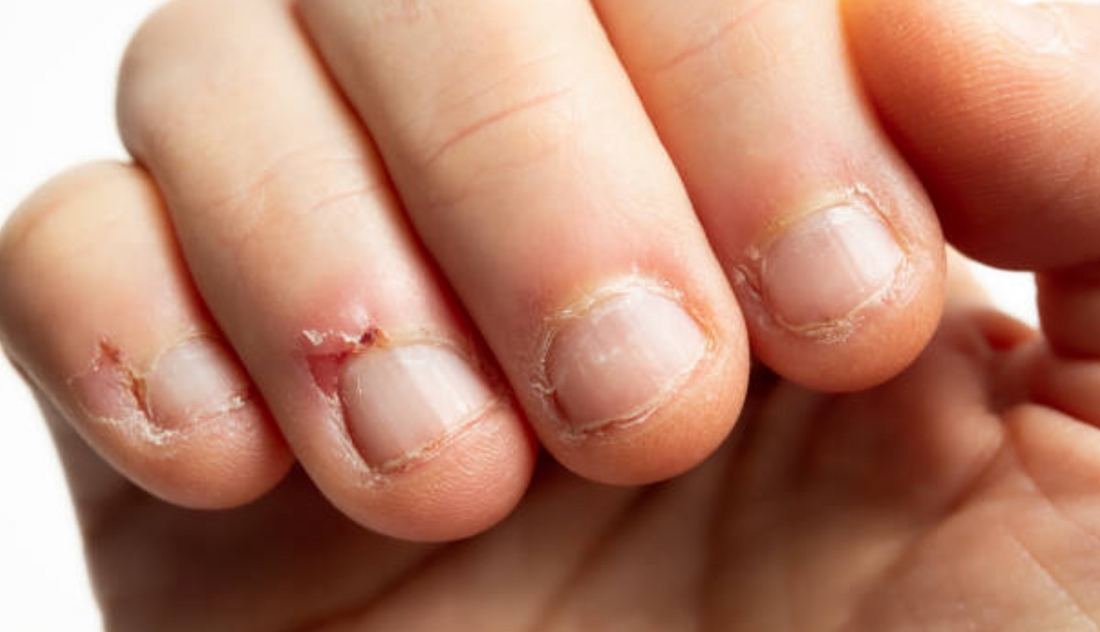
Right, let's address the elephant in the room. You've been at this so long that nail biting isn't just something you do, it's basically part of your personality at this point. Like being right handed or hating coriander.
And everyone has given up on you stopping it including, if we're being brutally honest here, yourself.
Your mum stopped mentioning it around 2010. Your partner has accepted that nice nails will never be your thing. And you? You've cycled through hope, despair, rage, and landed somewhere in the realm of "guess I'll die like this then." Twenty-odd years of chomping, and here you are, probably biting as you read this article about biting.
The "Lost Cause" Logic That's Actually Not True
Here's what your brain tells you after two decades of nail destruction: "If I haven't stopped by now, I obviously can't." Seems logical, right? Twenty years of evidence. Case closed. Might as well invest in plasters and accept your fate.
Except that's not how habit change works. At all. That's like saying if you haven't learned Spanish by 40, you never will. Or if you've been rubbish at cooking for twenty years, you're doomed to burnt toast forever. Your brain's talking absolute nonsense, but because it's YOUR brain, you believe it.
Twenty years doesn't make you broken - it just means you've got a very well-rehearsed neural pathway. Like a mental motorway for your fingertips to travel straight to your teeth.
Your Brain Has Literally Built Infrastructure for This
Speaking of motorways, let's talk about what twenty years of nail biting has actually done to your brain. And no, before you panic, you haven't broken it. But you have done some pretty impressive construction work up there.
Every time you've bitten your nails over the past two decades let's conservatively say 5 times a day, that's 36,500 repetitions you've strengthened a neural pathway. Your brain, efficient little organ that it is, has built you a six lane superhighway from "slight feeling of anything" to "fingers in mouth."
Someone who started biting last year? They've got a dodgy B road. You've got the M25. That's why you can go from "normal human doing normal things" to "full on fingertip carnage" without even noticing. Your brain doesn't need to think about it anymore. It's automated the whole process like a really unhelpful Tesla.
The neuroscience term for this is "procedural memory" the same type that lets you ride a bike or tie your shoes without thinking. After twenty years, nail biting isn't a bad habit it's a bloody skill. You could probably win competitions for speed and efficiency if that wasn't the world's worst competitive sport.
Why Everything You've Tried Was Doomed from the Start
Let me guess your greatest hits of failure:
- Bitter polish (lasted two days before you powered through the taste)
- Wearing gloves (looked mental, didn't last)
- Elastic band snapping (just gave you sore wrists AND bitten nails)
- "Mindfulness" (oh good, now you're hyperaware of your failure)
- Getting acrylics (worked for a little until you removed them)
- Willpower (LOL)
The problem isn't that you're weak or that these methods are complete rubbish (though some definitely are). It's that they're designed for people whose habits are still forming, not for those of us whose habits could legally drink in the US.
After twenty years, you need the equivalent of demolishing a building, not just painting over the cracks. But everyone keeps handing you paintbrushes and wondering why you're not fixed yet.
The Science of Why You're Not Doomed
Here's what research actually says about changing long-term habits: the brain remains plastic throughout your entire life. Neuroplasticity doesn't have an expiration date. Your brain can literally rewire itself at 30, 50, 70, whenever.
The Reality Check You Need
Will you ever be someone who never thinks about nail biting? Probably not. After twenty years, it's part of your operating system. But can you become someone who thinks about it but doesn't do it? Absolutely.
That's the difference between realistic and delusional goals. You're not aiming to become someone who's never bitten their nails. You're aiming to become someone who used to bite their nails. It's a crucial difference, especially for us lifers.
Think of it like being an ex-smoker versus never having smoked. Both don't smoke, but one knows the struggle. That's going to be you a reformed nail biter who still gets the urge when stressed but has other ways to cope. You'll never be innocent of nail knowledge, but you can be free of nail destruction.
The Bottom Line for the Two-Decade Club
Twenty years of nail biting doesn't make you a lost cause. It makes you experienced. You've got two decades of data about what doesn't work, which puts you ahead of every optimistic beginner with their bottle of Mavala Stop and their positive attitude.
Your neural pathways are deep, yes. But they're not permanent. Your brain built them, your brain can build new ones. Not quickly, not easily, but definitely possibly.
The fact that you're reading this article says something. After twenty years, you haven't completely given up. Some tiny part of you still thinks maybe, possibly, perhaps things could be different. That part's right.
So stop telling yourself you're a lost cause. You're not. You're just a really advanced case who needs strategies that match your experience level.
